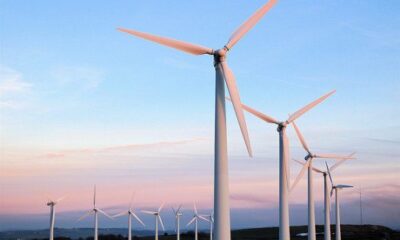

Features
Introducing a Blue & Green friend: Good Energy
Each day we’re introducing one, two or three of our new affiliate friends. If you click through the link in this article, the link is tracked and may generate a small payment to us. Sometimes the payment is per click, per user, per application, per accepted application or any combination of the above. That payment funds us so we can grow and encourage even more readers to live, spend and invest sustainably. Today it’s the turn of Good Energy.
They are a South West Company, based in Wiltshire and were the first dedicated 100% renewable electricity supplier.
They supply over 50,500 electricity customers, 24,000 gas customers and support over 73,000 homes, business and communities generating their own energy.
They have their own wind farms at Delabole, North Cornwall and Hampole, near Doncaster. And solar farms at Creathorne Farm near Poundstock, North Cornwall and near Wool in Dorset.
But more than simply sourcing 100% of their electricity from renewables, they’re helping the UK achieve a future that’s powered purely by renewables.
There’s a lot to do; it requires fundamental changes to the way energy is generated and used in the UK. But they believe it’s possible. And there’s a growing body of research, including their own, proving that it is.
Good Energy was founded over a decade ago with one clear goal – to make a difference to climate change. And they’re as true to that today as they were when they started out.
A different kind of energy company
Good Energy strongly believes that they have the opportunity to use the footprint of their business as a force for good, promoting best practice and holding themselves to the high standards that you have come to expect from them.
Good Energy is a UK owned company, based in Chippenham in the South West. They were founded in response to climate change, to be a catalyst for transforming the UK’s energy market by giving everyone the opportunity to choose renewable energy.
They don’t think the energy market needs to be complex and mysterious. They believe simplicity and transparency should not only be at the heart of how every energy supplier treats its customers, but in the way it does business too.
Good Energy buys power from renewable generators spread across the UK, from sources that include solar, wind, hydro and wave power.
For every unit of electricity their customers use, they buy a unit of electricity from one of these renewable generators. Because of the nature of renewables, sometimes they have too much power and sometimes too little, so they promise that over a 12 month period, each unit used by their customers is matched 100% with electricity sourced from their renewable generators.
Each day is broken down into 30 minute segments, and for each segment their trading team predicts how much electricity they think their customers will use and they also work out how much renewable energy their generators will be producing at that time too.
Their trading team specialise in forecasting renewable technologies and take over 25 weather feeds three times a day to calculate how much their renewable generators will be outputting. If they have too much power, they sell it to the market, and if they have too little power they buy from the market. The market electricity mix will depend from time to time on the overall power mix in the market.
Exactly how much power is generated from the Good Energy renewable sources is largely dependent on what the weather is doing. Good Energy contracts with many different generators who are spread far and wide across the UK, using a range of renewable technologies giving them a range of outputs. They combine this with their expertise in using advanced weather forecasting to predict how much electricity they will get from these sources, to maximise the value of power from all these renewable generators.
In addition to Good Energy buying and selling from the overall market to balance within any half hour segment, the purchaser and seller of last resort is the National Grid. The National Grid, rather than your chosen electricity supplier, has the responsibility of ensuring that your business or home is physically supplied with electricity. They supply your electricity demand with the source of electricity available at the time, from a range of different sources. They take over in the final hour to ‘fine tune’ the final changes either in demand or generation of power. Good Energy tries to avoid trading in this market because the costs are prohibitive. Their efforts go into ensuring that they have balance between their total power purchased and the demand of their customers before that point.
Their trading team ensures that they keep their promise that over the course of each year they buy enough renewable electricity so that all of their customer demand is matched from 100% renewable sources.
All suppliers have to report the mixture of fuels used to source their electricity, compared to the national average, on an annual basis.
This is enforced by DECC (Department of Energy and Climate Change) This is known as ‘Fuel Mix Disclosure’ and is published annually to help consumers make informed choices about their electricity supplier
To verify their electricity as renewable electricity, Good Energy uses Ofgem’s Renewable Energy Guarantees of Origin (REGO) certificates. On a 12 month basis, Good Energy obtains sufficient REGOs to verify that they have matched their customers’ demand with their supply to the National Grid. Ofgem states on its website that the REGO scheme “sets out increased transparency to consumers, allowing them choice to purchase renewable or non-renewable electricity”.
At Good Energy they ensure that all the electricity they sell to customers each year is matched 100% with electricity sourced from renewables. In addition they also have stringent procurement policies published on their website to help show which generators they consider to be renewable.


 Environment10 months ago
Environment10 months agoAre Polymer Banknotes: an Eco-Friendly Trend or a Groundswell?

 Environment12 months ago
Environment12 months agoEco-Friendly Home Improvements: Top 7 Upgrades for 2025

 Features9 months ago
Features9 months agoEco-Friendly Cryptocurrencies: Sustainable Investment Choices

 Features10 months ago
Features10 months agoEco-Friendly Crypto Traders Must Find the Right Exchange






























